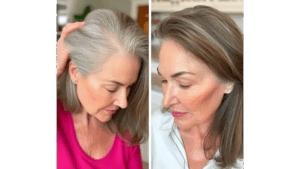Miami, Florida / Syndication Cloud / July 07, 2025 / Trybello LLC

Key Takeaways
- Chemical-laden hair products often contain harmful ingredients like sulfates, parabens, and formaldehyde that can damage hair and potentially affect your health
- Natural hair treatments nourish strands from within rather than just coating them, promoting sustainable hair growth
- Switching to clean hair products can improve scalp health, reduce irritation, and protect against environmental damage
- Trybello offers clean hair treatments that support your hair’s natural growth cycle without harmful chemicals
- Avoiding silicones and mineral oils prevents product buildup that can weigh down hair and block moisture absorption
The Hidden Dangers in Your Daily Hair Products
That satisfying lather from your shampoo might come at a price. Most conventional hair products contain a cocktail of potentially harmful chemicals that can damage your hair and scalp over time. What’s worse, these ingredients may even pose risks to your overall health with continued exposure.
Many people assume hair products are safe simply because they’re widely available, but the truth is concerning. The FDA provides limited regulation on cosmetic ingredients, leaving consumers to navigate potential hazards themselves. Your hair care routine could be exposing you to substances linked to everything from scalp irritation to more serious health concerns like hormone disruption and even cancer risks.
As someone who values both beautiful hair and overall wellness, understanding what’s actually in your hair products is essential. Trybello is committed to providing transparent information about ingredients so you can make informed choices for your hair health and growth.
7 Harmful Ingredients to Avoid in Conventional Hair Products
1. Sulfates: The Harsh Cleansers That Strip Your Hair
You know that rich lather you get from conventional shampoos? It likely comes from sulfates like sodium lauryl sulfate (SLS) or sodium laureth sulfate (SLES). While they effectively remove dirt and oil, they’re essentially industrial detergents that strip away your hair’s natural protective oils. This leads to dryness, frizz, and color fading. For those with sensitive skin, sulfates can also cause significant scalp irritation and inflammation.
2. Parabens: Preservatives with Potential Health Risks
Parabens are preservatives that prevent bacteria growth in your hair products, extending their shelf life. Look for ingredients ending in -paraben (methylparaben, propylparaben, butylparaben). These compounds have been detected in breast cancer tissues and may disrupt hormone function by mimicking estrogen. A healthy scalp environment is crucial for hair growth, and introducing hormone-disrupting chemicals directly to your scalp could potentially interfere with natural growth cycles.
3. Formaldehyde: The Invisible Toxin in Hair Straighteners
Formaldehyde appears in many keratin treatments and hair straightening products. This known carcinogen is sometimes listed under aliases like methylene glycol or formalin. When heated during styling, it releases toxic fumes that can irritate your eyes, nose, and lungs. Long-term exposure has been linked to respiratory issues and even cancer. Some hair straightener products have faced lawsuits due to their formaldehyde content and potential link to uterine cancer.
4. Silicones: Creating Artificial Shine While Blocking Moisture
Silicones (like dimethicone and cyclomethicone) create that slippery, smooth feel in many conditioners and styling products. While they make your hair look instantly shiny, they’re essentially plastic-like substances that coat the hair shaft. This coating prevents real moisture from penetrating your strands, leading to increased dryness over time. Silicones also cause product buildup that weighs hair down, flattens curls, and can ultimately impede healthy growth by suffocating the hair follicle.
5. Phthalates: Hormone Disruptors Hiding in Fragrances
Often unlisted on labels (hidden under ‘fragrance’ or ‘parfum’), phthalates help fragrances last longer in hair products. These chemicals have been linked to hormone disruption, reproductive issues, and even early deaths from cardiovascular disease. They’re so concerning that they’ve been banned in Canada, yet remain common in U.S. hair products. For optimal hair growth, avoiding hormone-disrupting chemicals is essential since your endocrine system plays a crucial role in hair health.
6. Mineral Oil: The Moisture-Blocking Petroleum Byproduct
A cheap byproduct of petroleum refining, mineral oil creates a barrier on hair that gives the illusion of shine. Unlike natural oils, it cannot penetrate the hair shaft to provide real nourishment. Instead, it sits on the surface, preventing moisture from getting in while attracting dirt and weighing hair down. Over time, this leads to drier, duller hair that’s more prone to breakage—the opposite of what you want for healthy hair growth.
7. Coal Tar & Benzene: Carcinogens in Common Hair Products
Coal tar appears in some anti-dandruff shampoos and hair dyes, while benzene can be found in hair dyes and dry shampoos. Both are petroleum derivatives and known carcinogens. Coal tar is banned in Canada and Europe but still permitted in the U.S. Recent recalls of popular dry shampoo brands due to benzene contamination highlight the ongoing safety concerns with these ingredients. A healthy scalp is the foundation for hair growth, and exposing your scalp to potential carcinogens is a significant risk.
How Chemical Ingredients Damage Your Hair and Health
Scalp Irritation and Sensitivity Issues
Your scalp is more absorbent than many realize. The harsh chemicals in conventional hair products can trigger irritation, redness, itching, and flaking—all signs that your scalp’s microbiome is out of balance. This imbalance creates an inhospitable environment for healthy hair growth. Many people mistake these symptoms for dandruff or seborrheic dermatitis when they’re actually experiencing reactions to chemical ingredients.
Dryness and Progressive Hair Damage
Chemical treatments create a cycle of dependency. They strip natural oils, leading to dryness, which prompts us to use more products to address the dryness, causing further damage. This cycle weakens hair over time, making it more susceptible to breakage and stunting growth. The artificial ingredients in these products can’t provide the genuine nourishment your hair needs to thrive.
Hormone Disruption Concerns
Several common hair product ingredients, particularly parabens and phthalates, are known or suspected endocrine disruptors. These chemicals can interfere with your body’s natural hormone balance, potentially affecting everything from metabolism to reproductive health. Since healthy hair growth depends on proper hormone function, these disruptions may contribute to hair thinning and loss over time.
Environmentally Harmful Runoff
When you wash your hair, those chemicals go down the drain and eventually into our waterways. Many conventional hair product ingredients don’t break down naturally and can harm aquatic ecosystems. By choosing clean, biodegradable hair products, you’re not only protecting your own health but also the environment.
4 Powerful Benefits of Switching to Natural Hair Treatments
1. Deep Nourishment Instead of Surface Coating
Unlike conventional products that simply coat your hair with silicones and synthetic polymers, natural hair treatments work differently. Clean, natural ingredients actually penetrate the hair shaft to deliver nutrients where they’re needed most. Natural oils like coconut, jojoba, and argan contain molecules small enough to enter the hair cuticle, providing real repair rather than temporary cosmetic fixes. When your hair receives genuine nourishment, it grows stronger and more resilient from the inside out.
Plant-based proteins in natural formulations help strengthen the hair’s keratin structure, while botanical extracts deliver vitamins and minerals that support cellular function at the follicle level. This deep nourishment approach supports the entire hair growth cycle in a way that surface-coating chemicals simply cannot.
2. Repair and Restoration of Damaged Hair
Natural ingredients have remarkable restorative powers. Hair damaged by heat styling, chemical treatments, or environmental factors can actually begin to heal when given the right natural care. Ingredients like shea butter, aloe vera, and avocado oil contain fatty acids and phytonutrients that repair the hair’s protective lipid layer, seal split ends, and restore elasticity to brittle strands.
Rather than masking damage with synthetic ingredients, natural treatments address the underlying structural issues. As damaged sections are repaired, new hair growth has a better chance of remaining healthy since it’s emerging from a well-nourished follicle into a properly maintained hair shaft. This creates a cycle where each new inch of growth is stronger than the last.
3. Promotion of Sustainable Hair Growth
Healthy hair starts with a healthy scalp, and natural ingredients excel at creating the optimal environment for growth. Many plant extracts have antimicrobial, anti-inflammatory, and circulation-boosting properties that directly benefit the scalp. Ingredients like rosemary, peppermint, and tea tree oil stimulate blood flow to the follicles, delivering oxygen and nutrients needed for strong growth.
Without the buildup of silicones and other synthetic coatings, the scalp can breathe properly. Hair follicles remain unclogged, allowing for unrestricted growth. Natural treatments also help balance sebum production, preventing both excess oiliness and dryness that can impede growth. The result is hair that grows at its maximum genetic potential, with greater thickness and length.
4. Protection Against Environmental Stressors
Our hair faces daily challenges from UV radiation, pollution, and thermal styling. Natural ingredients like green tea extract, vitamin E, and sea kelp contain antioxidants that neutralize free radicals before they can damage the hair structure. This protection extends to the cellular level, shielding follicles from oxidative stress that can impair growth.
Many natural oils create a light, breathable barrier that protects hair from heat damage without suffocating it. This means you can still style your hair while providing genuine protection that doesn’t compromise its health. By preventing environmental damage, natural treatments help preserve the integrity of both existing hair and new growth.
Transform Your Hair: Using Clean Ingredients for Healthier Growth
Making the switch to chemical-free hair treatments isn’t just about avoiding harm—it’s about actively choosing better results. When you eliminate the harsh chemicals from your routine, you’ll likely experience an adjustment period as your scalp and hair recalibrate. Your scalp may temporarily produce more oil as it recovers from the stripping effects of sulfates, or your hair might feel different without its silicone coating. But patience pays off.
Within a few weeks, most people notice their natural oil balance returning. Hair begins to develop genuine shine rather than artificial gloss. Scalp irritation subsides, and many find that flaking and itching they’ve battled for years simply disappears. Most importantly, the hair growth cycle optimizes, potentially leading to thicker, faster-growing hair.
Natural hair treatments can transform your hair growth journey with powerful plant-based formulations that nourish from root to tip.
Trybello LLC
40 SW 13th St
Ste 902
Miami
Florida
33130
United States

















